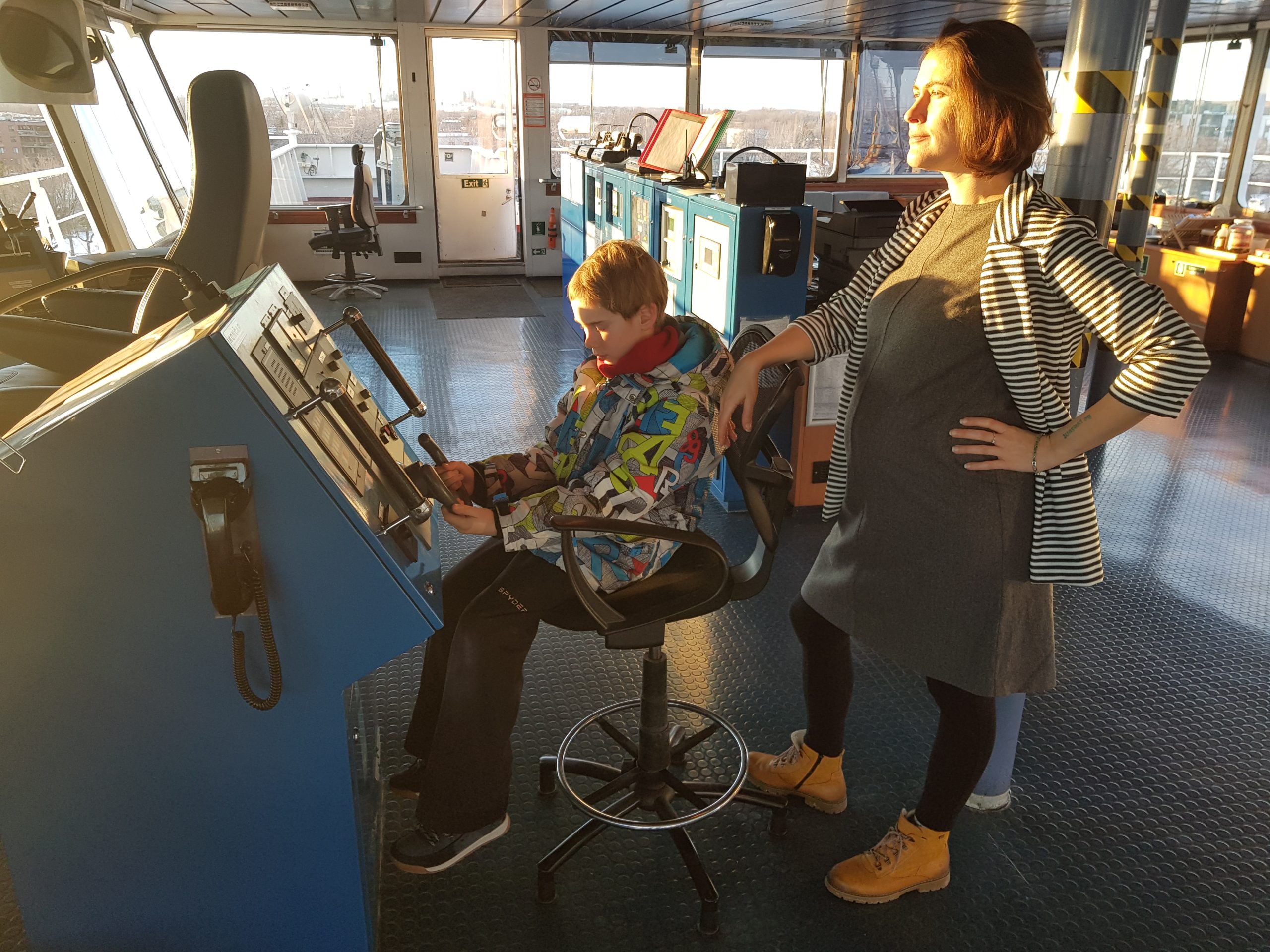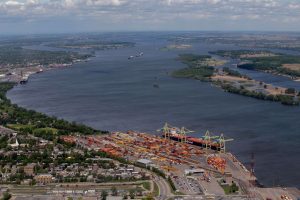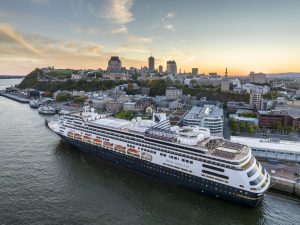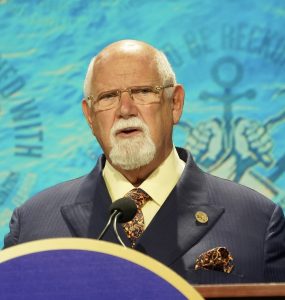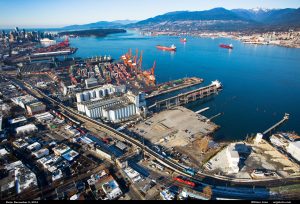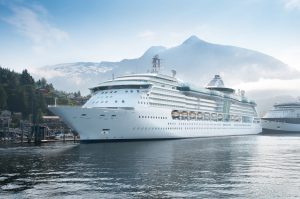(Primary Photo) Wife and son of Ukrainian seafarer Viacheslav Solianyk are pictured visiting the wheelhouse of a Desgagnés vessel.
Julie Gedeon*
Ruslan Butenko is eager to see his new work schedule as a Captain in Training on Algoma Central Corporation’s domestic vessels. He’s already sailed aboard the Algoma Intrepid, learning for the first time to operate the self-unloading ship.
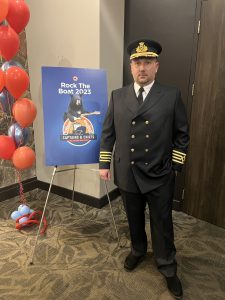
(Photo) Recent hire Captain Rusian Betenko was present at the Algoma Central Corporation annual meeting of captains and chief officers last February 28.
“No matter what my assignments, I’m grateful to be in Canada working for a company that has been supportive of this new start in my career and life,” says Capt. Butenko, who sought refuge for his young family from the war in Ukraine.
Algoma, CSL, Groupe Desgagnés, and McKeil Marine are among the Canadian ship owners that have welcomed qualified Ukrainian seafarers and other marine personnel after Russia invaded their homeland in February 2022.
Butenko was aboard a German vessel when the Russian invasion started. “I had to work by phone and Internet to help my wife and daughter, who was just four months old, to find their way to safety,” he says.
That journey involved his family escaping to neighbouring Moldova, traveling next to Bulgaria, followed by Cyprus, then Italy to complete the necessary identity biometrics for Canada, and his wife and daughter returning again to Cyprus to stay with her sister while he made his way here to begin his new job and find a place for them to live.
“It was so wonderful when I arrived at Pearson International Airport on December 6th and the Customs officer said, ‘Welcome to Canada. You and your family will be safe now,’” he recalls.
Needed seafarers
Bruce Burrows, President and CEO of the Chamber of Marine Commerce, applauds the federal government for making it easier for CMC member companies to employ more than 30 experienced seafarers from war-torn Ukraine to come to Canada, with more on the way.
“The emergency travel measures for Ukrainians introduced in early March 2022, followed by Transport Canada recognizing the competency of foreign seafarers having a valid Standard for Training, Certificating and Watchkeeping or STCW certificate, have been pivotal to a number of Ukrainian seafarers and their families arriving here with visiting visas and work permits,” Burrows says.
“We’d certainly like to see the federal government continue those policies, but also to clear the way for those who want to become permanent residents to do so,” he adds. “Canada is seriously lacking qualified maritime personnel, and Ukrainian seafarers are known to be some of the best in the world.”
Butenko graduated from the marine academy located where he was born in Odessa, Ukraine, and then worked for the same German ship owner for 19 years. “I had some familiarity with Canada because we commonly sailed between Europe and the Great Lakes ports,” he says.
He submitted his application and qualifications, along with the endorsement of several pilots, to Algoma online. After a series of interviews, he was hired with the understanding that the necessary visiting visas and work permit had to be obtained.
Good corporate citizenry
Algoma has 15 people employed from Ukraine now, with more expected. “We’ve been considering foreign applicants since Transport Canada signed reciprocal agreements with maritime authorities in other countries but, for obvious reasons, the ones from Ukraine particularly caught our attention,” says Brooke Cameron, Algoma’s Senior Manager, Fleet Personnel. “We considered it good corporate citizenry to shift our focus to Ukrainian applicants seeking to escape the currently dire situation in their homeland.”
The company set up a recruitment team to help Ukrainian applicants to understand Canada’s work permit and visa processes, as well as Transport Canada’s maritime requirements.
Butenko appreciates the assistance that Algoma, the Canadian government, Red Cross members, and Ukrainian-Canadian volunteers have provided since his arrival. Butenko was helped to set up a bank account, obtain a social insurance number and Medicare card, as well as submit his maritime qualifications to Transport Canada for review. Algoma assisted with the out-of-pocket costs for his documentation.
“I received a nice welcome to Algoma’s offices last January 5th to meet others and become oriented,” Butenko recalls. “The next day I was working aboard the Algoma Intrepid which is such a nice, modern self-unloading bulk carrier that’s only two years old.”
Butenko particularly appreciates the special training program that Algoma has set up for the foreign seafarers it hires, to become familiar with the procedures for all of its vessels over an approximately two-year period. “What’s also really great is that each captain in training, like me, can also apply for self-pilotage training, which is really important as most Canadian ship owners have captains with this self-pilotage certification for all the Great Lakes and Seaway transits,” he says. “Algoma is making a big investment for people like me.”
He looks forward to working for about two months on a vessel and then having some time off with his family until his next assignment. “On international vessels, I often worked four months at a time, and then sometimes up to six months with the Covid restrictions,” he says. “It will be nice to spend more time with my young daughter.”
Other key personnel

(Photo) Algoma’s fleet personnel coordinator, Iryna Upir, with her two children and husband Sergei, who hopes that his seafaring experience will be recognized by Transport Canada.
Algoma is pleased to welcome these Ukrainian seafarers at a time when all of the maritime industry is short on labour. “There’s a very limited supply of marine employees in Canada,” Cameron explains. “And this is an opportunity to bring certified, highly skilled, professional and experienced seafarers into our domestic maritime business… and benefit from a more diversified workforce.”
Cameron says it’s still early days with the first recruits aboard with Algoma, but the company already sees the positive, hard-working attitude they bring to the workforce. She is also seeing it directly with the new fleet personnel coordinator recently hired from Ukraine and working in her own department.
Iryna Upir had been working as a fleet coordinator for a Ukrainian branch of a Greek shipping company when Mariupol, Ukraine, came under Russian attack. Her seafaring husband was far away on a ship at the time. “Fortunately, my mother and I met this guy who told us about this one road leading out of Mariupol being clear,” she recalls. “My car had not been seriously damaged by the bombing and could go another 100 kilometres, so we put my two young children and some things in it and went.”
She reunited with her husband in Greece, where her mother had friends and decided to stay. “My husband and I had already been thinking of trying to move to Canada, so I found out about Algoma online and sent my application,” Upir shares.
“After my interview, Algoma offered me a data entry job, but said there might soon be a position opening in fleet personnel coordination,” she relates. “Luckily, we had applied for our visiting visas and work permits already, so I was able to start my new job as soon as I arrived last September 22nd – a date I will never forget because it changed our lives.”
She praises her Algoma coworkers for making her feel so welcomed and fully explaining anything she needs to know. “Since joining Algoma, I’ve actually gone aboard a ship for the very first time, which was exciting, as well as some work conferences and job fairs representing Algoma,” she says. “And I just love my job and am working hard to become familiar with all of Canada’s maritime labour regulations.”
Her husband, Sergyi, has found part-time work in St. Catharines, and is now applying to have his maritime training and experience recognized by Transport Canada so that he can apply to Canadian ship owners.
Like numerous other Ukrainians recently arriving in Canada, she has a six-year visiting visa and three-year work permit.
“My five-year-old son, Valerii, is already learning a lot of English and making friends at his kindergarten, and I’m sure it won’t be long before my three-year-old daughter, Kateryna, starts to pick up more English, too,” Upir says. “So, if the federal government could help us to become permanent residents, it would be great because we really love it here and feel safe.”
Already onboard at Desgagnés
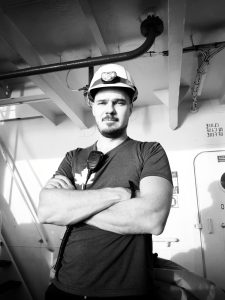
(Photo) Viacheslav Solianyk hopes to stay permanently in Canada with son Viacheslav and wife Anastasiia, who is expecting a second child in May.
Viacheslav Solianyk had already been working aboard Desgagnés vessels under contracts for five years as part of the crews hired for international routes. “When the Canada-Ukraine reciprocal maritime training recognition was established in March 2022, I submitted my candidacy to work on Desgagnés ships under the Canadian flag,” he shares. “I hoped this would provide the safety and stability that I need for my family.”
He was in Thailand aboard a chartered Desgagnés ship when he learnt about Russia’s invasion of his homeland. “I phoned my wife at 4 am her time and just told her to grab our young son and leave,” he shares. “Fortunately, my wife had been working in a management position for a French company in Ukraine and her boss, who was a kind woman headquartered in Paris, invited her our son to stay there as long as needed.”
Anastasiia and their son, also named Viacheslav, joined Solianyk last August in Montreal, where he is based as a Chief Officer aboard Desgagnés cargo vessels and training to be an officer within the company’s tanker fleet.
Solianyk is one of two such recruits at Groupe Desgagnés to date, with others expected.
“Our situation so far is a bit different in that both of these Ukrainian seafarers were already working aboard our cargo vessels for several years as part of the foreign crew sailing international waters seasonally for us,” explains Erick Bergeron, Vice President, Human Resources, Groupe Desgagnés. “We already knew them well when they applied to work in Canada as Chief Officers.”
Solianyk was still aboard a Desgagnés vessel when it had arrived in Canada after sailing internationally, and Customs Canada promptly granted him the right to work in this country. His family enjoys living in Montreal, finding it similar in size and bustle to their former city of Kyiv.
He previously worked for mostly German ship owners. While he obtained his master’s degree in economics, he disliked office life. He might actually have saltwater in his blood, preferring to follow in the steps of both his seafaring father and seafaring grandfather.
“I love what I do, using marine science and experience to safely navigate a vessel and oversee its loading and unloading at each place,” he says. “I’ve really enjoyed the few trips that I’ve made so far up to the Arctic, which is a unique experience, but the cargo side of operations isn’t significantly different.”
Solianyk also greatly appreciates how Desgagnés prioritizes safety. “This company, unlike a few others I’ve run across from other countries, aren’t just concerned about the business,” he emphasizes. “The management cares about the employees, never takes shortcuts, and will back a captain who for safety reasons doesn’t want to sail in difficult weather or wave conditions, even if a charterer is insisting.”
Another big perk: “The food on the ship is really good!” he says.
Bergeron says Groupe Desgagnés is definitely interested in continuing foreign recruitment with labour shortages expected by all sectors in North America for a number of years to come.
“We’re receiving numerous applications from all over the world every week, so it would help if there were an easier way to assess people’s qualifications and how familiar these applicants are specifically with Canadian regulations,” he says. “In fact, I recently spoke with a Canadian Coast Guard official who said the agency is in the process of developing an online form with a questionnaire to validate whether those who are interested have the necessary maritime qualifications and knowledge.”
Solianyk also hopes that families like his can remain in Canada. With his wife expecting their second child in May, he is eager for the Canadian government to modify or create an immigration program to make it possible for him and other seafarers to obtain permanent residency.
“I really appreciate what the Canadian government has already done for my family and me, but six months of my three-year work permit are gone already,” he notes. “With the shortage of seafarers in Canada, I really hope that the government sees it as a good idea for my family to permanently live and work here, buy a home, pay taxes, as well as contribute to Ukrainian needs.”
*Julie Gedeon is a veteran Canadian journalist with notably considerable expertise on developments impacting on the Great Lakes/St. Lawrence System. This report is published with the kind permission of Marine Delivers of The Chamber of Marine Commerce.


